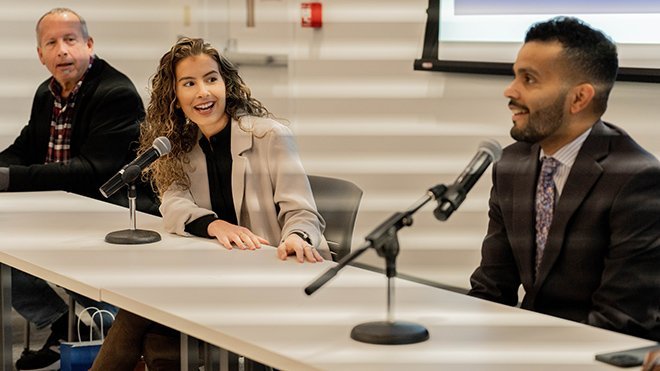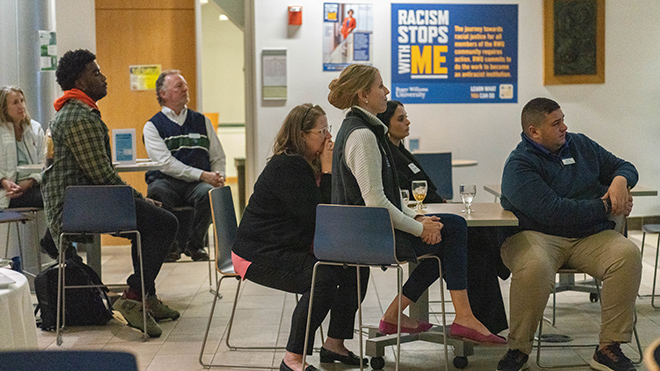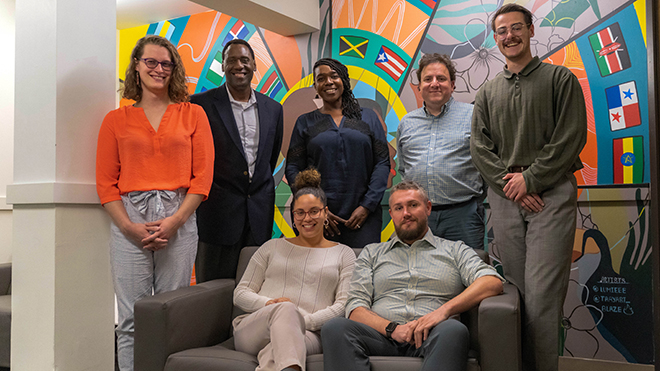With Focus on Student Success, RWU Builds on DEI Initiatives and Opportunities to Engage
Equity Action Plan informs institutional commitment to embedding equity and efforts such as the Roger Pledge, First-Gen Day and more ways to connect student communities.

BRISTOL, R.I. – Guided by the university’s mission to advance greater and more equitable student success, the Office of Diversity, Equity, and Inclusion has launched several major initiatives and efforts this year aimed at creating a campus where every student can be fully themselves and thrive.
As part of those efforts, Roger Williams University celebrated our second annual First-Gen Day on Nov. 8, featuring a series of events honoring our community of first-generation students, alumni and employees.
“The most important thing I’d like others to understand is that as first-generation students, we come in many different forms. There’s no one specific first-gen student,” sophomore Waldino Joseph, an Engineering major from Stamford, Conn., said during a first-gen student panel. “It’s important to acknowledge that we have different experiences in addition to those similarities.”
Three alumni – Theresa Agonia ’13, Omar Reyes ’11, and Paul Lavallee ’76 – shared their stories of attending RWU as first-gen students and imparted some advice to current students.
When asked why they remain engaged with Roger, Agonia, the chief of external affairs to Providence Mayor Jorge Elorza and Central Falls, R.I., native, said, “I just really want kids who grew up like me to feel like they belong in a place like this. … It’s so important to see representation.”

This year, the DEI team is focused on continuing the progress of our institutional equity work and creating more opportunities for students to connect, participate and find community through initiatives such as the next phase of the Equity Action Plan, which will interconnect its objectives and goals to RWU’s Strategic Action Plan, and Racism Stops With Me, the university-wide antiracism campaign launched last year.
“Our team is thinking about the student experience, what student success looks like, and what our role is in advocating and creating opportunities for student success to occur,” said Stephanie Akunvabey, Vice President for Equity and Inclusion and Chief Diversity Officer. “To that end, we’re focused on pushing a couple of big initiatives forward this year.”
Take the Roger Pledge
As the next stage of the university’s antiracism campaign, the Roger Pledge is a personal commitment to “discourage racial prejudice by others at every opportunity,” “treat all people with dignity and respect,” “commit to working with others to transform the RWU community into a place that treats people of all races, ethnicities, and cultures with justice, equity, and compassion,” and more.
Signing the Roger Pledge, which was inspired by the Birmingham Pledge, is a commitment on a personal level; it is anonymous so names will not be shared publicly, Akunvabey noted. It provides another way for university community members to join the antiracism campaign mission and take part in the work to become an antiracist institution and gain a deeper understanding of racism and its impact on our BIPOC community.
“The Roger Pledge is an opportunity for every member of the RWU community to voice their support for our effort to become an antiracist campus and think about what it means to enact an antiracist approach in their work on a day-to-day basis,” she said. “I hope that people look at the intent behind the Roger Pledge and choose to live in a way that embodies what the pledge says.”
Connect & Engage
Boosting student engagement is one of the team’s goals, said Michael Walsh, Director of Institutional Diversity, Equity, and Inclusion, who plans to work with more campus partners to host events for students throughout the year.
“We want to do events and functions that can really bring in some different influences,” he said. “That includes working with student groups and organizations and hopefully some faculty partnerships, which will get folks to engage with our students in a different capacity.”
In addition to First-Gen Day, the DEI team hosted an Open House in September for the Intercultural Center (IC) and the Queer and Trans Resource and Advocacy Center (QTRAC) as a way for students to learn more about the spaces, Walsh said.
Jamie Wire, Assistant Director of Queer and Trans Initiatives, has also been working to increase student engagement. One of her goals for the year is to develop new initiatives through the QTRAC such as the inaugural Coming Out Day BBQ, which took place on Oct. 11. Wire has also been building on RWU programs such as Safe Zone Trainings and the Kinship Collective Mentor program.
“Community building is an important part of the work,” Wire said.
Walsh said to stay tuned as they plan to host new programs that highlight the different cultural contributions to our campus, including a Kwanza celebration and reception in December. “We really want to highlight the greatness of our students,” he said.
Embedding Equity Across Campus
Throughout all these efforts, the university’s core mission is to embed equity into all areas of campus life and across institutional decisions, policies, and practices. With that aim, Chris Calienes, Dean of Institutional Diversity, Equity, and Inclusion, said that while RWU has many great social support programs and continues to evaluate these on an ongoing basis, one of his goals is to work with faculty and academic affairs to diversify the academic experience for students and explore more DEI issues in the curriculum.
“We can’t do it alone. We need faculty and staff involvement to really hammer home the message of inclusivity,” said Walsh, noting that he’d like to have more faculty members visit the IC to talk about their programs of study.

Recently, Wire submitted the university to the Campus Pride Index, which gave RWU 4 out of 5 stars for support and inclusivity of our LGBTQIA+ student community. The university received highest marks in counseling and health services, residence life, campus safety, and institutional support and commitment. For Roger’s first time completing the Index, Wire said 4 stars is an incredible rating. “It speaks to the groundwork and foundation laid by others,” she said, adding that the goal is to assess and make improvements so that RWU reaches 5 stars.
“Stephanie and I are working together to set up meetings with partners to go over the results,” she said. “It’s a great conversation starter.”
Incorporating Intersectionality
Ensuring intersectionality is a central part of any antiracist work so that students feel comfortable embodying all their identities in any space is another major focus of the DEI team, said Calienes, who is gay and a native of Peru.
“When I attended my college, I had the Latino students’ association, and I felt culturally noticed and appreciated, but I couldn’t be gay there. Then I would go to the Safe Zone Center, and it was great to be around other queer people, but I couldn’t be Peruvian there,” he said. “I don’t want our students to ever have to make that choice.”
To that end, Wire said she wants the QTRAC and IC to collaborate more on events and to think about centering our queer and trans students of color. She has plans to host more intersectional events by working with the Sexuality and Gender Alliance, Multicultural Student Union, Women of Color Club, and Barbershop Club, a group for men of color.
Wire also wants to work with the Student Accessibility Services (SAS) team and with different spirituality and religious groups on campus “to make sure we’re covering a lot of different bases,” she said.
Check out the IC and QTRAC on Instagram for their latest events: here and here.